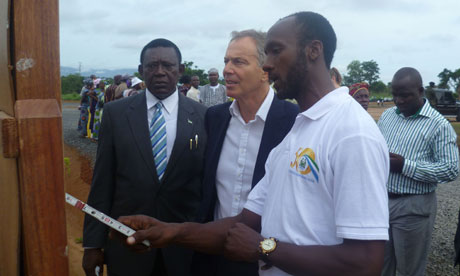Former prime minister tells the Guardian that international aid is not the only solution to Africa's problems
- guardian.co.uk,
- Article history

Tony Blair meets workers at the Africa Felix fruit juice processing factory in Sierra Leone.
Africa's problems have been caused as much by a lack of capacity to govern as a lack of aid, according to Tony Blair. But the former prime minister is urging a wavering British public to recognise that aid has worked and he applauds the Conservatives for continuing with the Labour policy to increase aid as a proportion of UK GDP.
His remarks came during a visit to Sierra Leone where he is feted for his role in deploying British troops to save the country from civil war and for setting up a small advisory team in the heart of President Ernest Bai Koroma's offices.
Speaking to the Guardian above the bustle and colour of Freetown's markets, he said: "Aid is important and it works and we should be really proud of what we as a country have done in aid, but aid is one half; the other half is governance. For most of these countries, their problems are every bit as much governance, as much as the lack or availability of aid."
Blair argues African governments need strengthening if they are to take advantage of aid and build self-sustaining growth.
His three-year-old Africa Governance Initiative (AGI), operating in Sierra Leone, Rwanda and Liberia, may not be the most publicised part of his post-prime ministerial work but is the one that privately seems to give him the greatest satisfaction.
Small highly talented and motivated teams operate at the centre of each government, advising, cajoling, planning and delivering.
He said the concept – they sound like mini-Downing Street delivery units in his description – had proved to be sufficiently successful that AGI would expand this year to at least two other African countries.
Blair said: "Modern government is not about the traditional civil service, it is about getting things done. It is about effecting change. The delivery unit concept has been exported all round the world.
"Our teams are not fly-in-fly-out consultants. They have to be embedded in the system. That is how you build trust.
"All of these countries have got masses of reports lying on the shelf telling them what they need to do. I keeping saying the 'what' is not hard to work out. It is pretty bloody obvious most of the time. The question is the 'how'.
"The only difference between developing and developed countries is the scale of the problems and the resources you have. The problems are at one level different but at another level they are the same. They are about getting things done."
One of AGI's first pieces of advice to African leaders is to prioritise. "In all these countries we say 'if you have 100 priorities you will get nothing done, but if you have a limited number of objectives that is different'."
He said that unless African governments delivered, faith in fledgling democracies could quickly erode. In Sierra Leone, 50 years after independence, local government has recently been reintroduced.
"In the west, we are quite naive about this. Democracy is the beginning but you have to effective programmes in government to back it up," he said.
The government has finally established an energy plant that has brought electricity to Freetown after years of false starts and launched a free healthcare initiative for the under-fives and pregnant women that was once deemed too complex to put in place.
A private sector business conference last year championed by Blair has seen a flow of investment into the country. Agribusiness and tourism investments this year have exceeded $200m (£124m) but problems still need to be rectified. Although mangoes are plentiful in the country, the mango juice sold in Freetown comes mostly from Lebanon.
"I do not want to exaggerate progress, this is still a very, very poor country, one of the poorest in the world but, with luck, the next election will be fought on what the president has achieved and got to achieve. That is not always the way elections in this part of the world work," Blair said.
More broadly, he argues, Africa is on the move. "It is going to stop being a byword for conflict and disease and it is going to start to really develop its potential. It is where Latin America was a couple of decades back," he said.
"It is resource rich and, at some point, it will click and for Britain to be a leading player is very wise. It is good for the country. It is not a piece of charity; it is a very wise investment in the future."
He said he could sense prime minister David Cameron was facing a battle with public opinion over keeping the aid budget expanding at a time of general austerity.
Blair said: "I totally understand that and completely see why people ask why do we spend it there when other budgets are being cut at home – but, if the British people came and saw what is happening in these countries and how it is being used [they would see] it is not being wasted. These changes are not incremental improvement. They saves lives – you can measure it and see it."

No comments:
Post a Comment